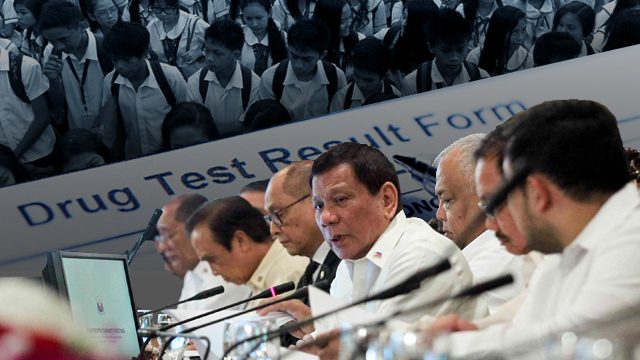SUMMARY
This is AI generated summarization, which may have errors. For context, always refer to the full article.

MANILA, Philippines – The Department of Education (DepEd) plans to consult Cabinet officials on its guidelines for the planned drug testing of public high school students this school year.
The random drug testing was originally slated to begin in September, but this has been delayed following Education Secretary Leonor Briones’ plan to formally present the guidelines before the Cabinet.
“The secretary wants to present the program to the Cabinet… because there might be certain comments or things that the members of the Cabinet will want to bring up,” Education Assistant Secretary Nepomuceno Malaluan told Rappler.
The next Cabinet meeting is scheduled on October 2.
Malaluan, however, stopped short of saying that the random drug testing was postponed because of this planned Cabinet consultation. (READ: High school drug tests: DepEd reviews procedure amid concerns)
“It’s not really postponed… Actually, our commitment is to implement it within the school year of 2017 to 2018,” said Malaluan, who is part of the 3-person ad hoc committee that the DepEd created to oversee the random drug testing.
Under DepEd Order Number 4, series of 2017, junior and high school students will be subjected to random drug testing to determine drug use prevalence.
Parents will first be informed about the guidelines of the random drug testing through a regular or special general assembly or a parent-teacher conference. The students and their parents will also be notified about the procedure in writing.
But failure to return the acknowledgment slip of this notice “shall not be a bar to the conduct of the drug testing and of the said students’ inclusion in the sample” – one main contention of parents and groups against the procedure. (READ: Random drug testing of students will make minors ‘open targets’)
Malaluan said this is why they continue to consult with statisticians “if the sampling can accommodate consent.”
“Can we still have the same confidence [in] the results if consent is factored in?” he said.
“With that ultimately, I think, that’s why we’re being cautious or careful because the way we will do the orientation will spell the difference whether this will be supported strongly both by our students and their parents,” Malaluan added.
The DepEd also ordered private schools to conduct random drug testing of their high school students, but the procedure must be aligned with the department order.
‘Coded’ samples for confidentiality
The DepEd order said a stratified cluster sampling method will be employed. The goal of the sampling population is to yield a 95% statistical confidence level in determining the prevalence of drug use among students.
“I think all regions will have to be represented. And then the schools will be randomly picked, and then after that, at the school, we will also randomly pick a certain number of students,” said Malaluan.
He estimated that at least 20,000 public high school students will be chosen for the random drug testing, but this figure is based on last year’s enrollment population up to Grade 11 only.
The DepEd expects to get the complete data on this year’s enrollment population up to Grade 12 this week, which means the number of students covered by the random drug testing may increase.
Malaluan gave an assurance that “there will be some code in the master list [for the chosen students] that will be kept confidential.”
Briones already defended the random drug testing of students, saying it is designed to be “preventive, not punitive.” She said students whose tests turn out positive in both the initial and confirmatory drug tests will be subjected to rehabilitation by Department of Health-accredited medical experts.
The students’ drug test results will also not be used as basis to punish them within or outside of school.
Malaluan said they are also meeting with representatives from the National Privacy Commission this week “just to make sure our confidentiality rules are really airtight.” – Rappler.com
Add a comment
How does this make you feel?
There are no comments yet. Add your comment to start the conversation.